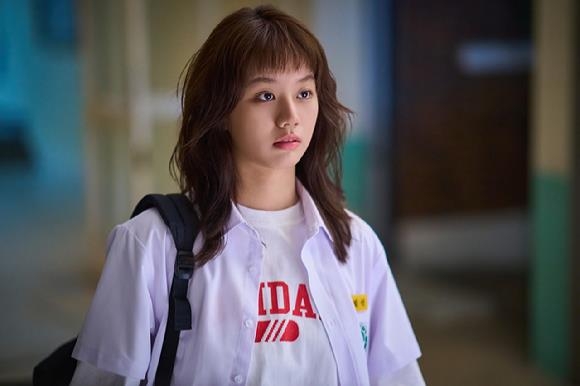(Movie Review) 'I cheer for myself': 'Victory' brings '90s high school spirit to life

SEOUL, Aug. 9 (Yonhap) -- The coming-of-age film "Victory" demonstrates that a film can shine brightly even with a simple story, provided it is supported by the strength of its characters.
Set in the sleepy southern town of Geoje in 1999, the movie follows teenagers forming a cheerleading club, focusing on their challenges and persistent efforts to grow as a team.
Lee Hye-ri, better known as Hyeri from the former girl group Girl's Day, plays the main protagonist Pil-sun, a dance-passionate high schooler who establishes the Millennium Girls cheerleading club. She is joined by her best friend Mi-na (Park Se-wan), transfer student Se-hyun (Jo A-ram) from Seoul and a diverse group of enthusiastic girls.
At first glance, Pil-sun might seem strikingly similar to Duk-sun from the popular TV series "Reply 1988," which helped catapult the actress to stardom, due to the shared retro themes and the characters' mischievous, lively demeanor.
However, Hye-ri has created yet another memorably endearing character, one who refuses to give up and relentlessly pursues her dream of becoming a dancer. She delivers emotionally charged scenes with a convincing use of the South Gyeongsang Province dialect, showcasing her versatility as an actress.
Inspired by a real-life high-school cheerleading club formed in Geoje in 1984, the movie features a vibrant ensemble of underdog characters, each with a distinct personality -- from a natural-born dancer and a taekwondo enthusiast to an optimistic doomsday believer and a deceptively timid yet resilient model student.
The chemistry among these diverse characters and their collective performances breathe life into the film's otherwise predictable storyline. Their synergy not only compensates for the plot's simplicity but also infuses the narrative with depth and charm.
With the slogan "I Cheer for Myself," the cheerleading club goes around the small town of Geoje, offering support to villagers, those close to them and of course, themselves. It also dutifully roots for the school's soccer team, for which it was originally created.
The film's uplifting atmosphere and nostalgic journey to the late 1990s are further enhanced by a soundtrack of iconic K-pop hits from the era, including Kim Won-joon's "Show" and Seo Tae-ji and Boys' "Hayeoga," as well as period-specific fashion and trends.
However, the team's journey takes a turn when Pil-sun is disciplined after core members of the cheerleading squad are involved in a fight. Determined to pursue her ultimate dream of becoming a dancer, she decides to leave school.
Just before she departs for Seoul, a pivotal scene highlights the father-daughter dynamic, emphasizing generational conflict and offering thought-provoking reflection on the losses that come with age. Pil-sun's father asks her, "Do you think life is that easy? Is life really that simple?" To which Pil-sun sharply responds, "For me, it is. What's so hard about it?"
While Pil-sun is away from home, her father, whom she views as leading a "dreamless" life as a single dad and a middle manager at a shipbuilding company, musters the courage to confront life's challenges, rather than simply lamenting them.
The scenes where Pil-sun's father finally joins his coworkers in protesting for better working conditions provide viewers with both catharsis and reassurance, demonstrating that it is never too late to demand more from life. Audiences may find themselves both cheering and feeling uplifted throughout the film.
"Victory" is scheduled for release Wednesday.
jaeyeon.woo@yna.co.kr
(END)





